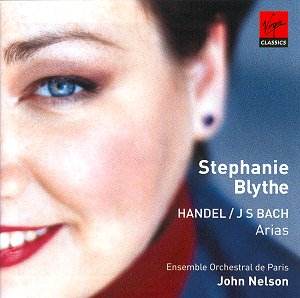 
Crotchet
AmazonUK
AmazonUS |
Georg Friedrich HANDEL
(1685-1759) Operatic Arias Serse Frondi tenere... Ombra mai fu (3:43) Hercules Where shall I fly (6:49) Semele Awake Saturnia... Iris, hence away (4:56) Giulio Cesare Al lampo dell'armi (3:29) Dall'ondoso periglio... Aure, deh, per pietà (8:33) Priva son d'ogni conforto (5:56) Madre... Son nata a lagrimar (8:21) with David Daniels countertenor Johann Sebastian BACH (1685-1750) Sacred Arias St Matthew Passion Erbarme dich, mein Gott (6:20) Können Tränen meiner Wangen (7:04) St John Passion Von den Stricken meiner Sünden (5:09) Es ist vollbracht (5:49) Mass in B minor Agnus Dei (5:19) Ensemble Orchestral de Paris/John Nelson Rec: December 2000, Eglise Notre Dame du Liban, Paris, France. |
This disc, which is Stephanie Blythe's first recital recording, attempts to show a variety of tones and emotions, and the full range of her voice.
Blythe has a sweet voice, very attractive, yet sometimes a bit too forceful. However, she commits far too much vibrato, especially in passages where it really detracts from the music and from her voice. Rather than use vibrato as an effect on longer notes here almost every note is quivering making the shorter notes difficult to hear correctly. This works better in a forceful aria, such as Handel's Awake, Saturnia… Iris, hence away, from Giulio Cesare.
This is not merely an issue of historically informed performances (HIP) as opposed to more "modern" performance; it is also a matter of personal taste. I cannot listen to someone whose voice sounds like it has St. Vitus' Dance, especially when it detracts from the melodies they are singing. Others may, indeed, feel differently, or may not be sensitive to this issue at all. For an article on vibrato in baroque vocal music, see: http://ladyviola1593.tripod.com/musichistory/
Blythe's voice can also be more silky and mellifluous, at times, such as in Bach's Agnus Dei, from the B Minor Mass, but most of the arias chosen highlight the strength of her voice, as opposed to its fluidity. Short, choppy notes, such as Handel's Al lampo dell'armi, from Cesare, show more her ability to jump around, rather than any true tone.
Blythe's rendition of Erbarme dich, mein Gott from the St. Matthew Passion is quite nice, yet she seems to lack the conviction and spirit necessary to make this aria come true. Here, as in the other pieces, she tends to overuse vibrato and to be too forceful; this song should be sung as a long sigh, but she tries to impose her presence.
The selection is not surprising. These are the same arias that are often heard on such recordings. Stephanie Blythe certainly has a nice voice, yet it may not be appropriate for this repertoire. She comes through better in the Handel, which, as operas, call for a more imposing voice than Bach's sacred music. This is a recording of baroque music for people who are not really fans of baroque music.
Kirk McElhearn